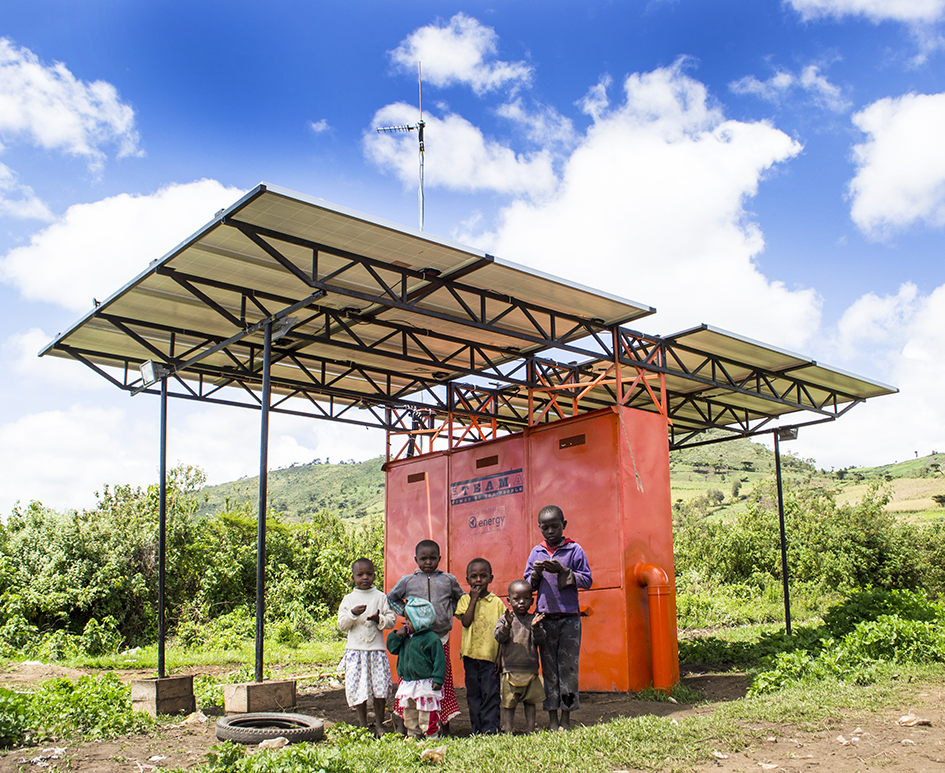How did TFE Consulting get its start?
TFE Consulting grew out of Tobias Engelmeier’s work covering the renewable energy industry in India through his consultancy, Bridge to India. TFE Consulting provides services to the Mittelstand–mid-sized manufacturers in Germany–as well as larger corporations like ABB and Siemens and development banks like KFW and the World Bank.
What sectors and markets does TFE Consulting focus on?
In terms of geography, we are focused on Africa, South Asia, and Southeast Asia. Overall, we are focused on understanding the energy transition in light of the digital revolution and how this affects renewables, energy access, efficiency, mobility and the way we build cities.
Energy access is one pillar of our work. Emerging technologies like electric cars, blockchain payments, and other frontier technologies are also core to what we do. We have ongoing research into the applications of big data, energy efficiency, and smart grid technologies in European markets.
We aim to provide companies with insights into emerging industries and, specifically in energy access, a perspective on how things will play out in practice. Having spent most of my life in Africa and six and a half years in Kenya founding SteamaCo (an off-grid smart metering company), I have strong on-the-ground experience. After starting Bridge to India, Tobias has gained a deep knowledge of the South Asian market.
Working with stakeholders across the spectrum from national governments to rural villages has given us a deep understanding of which interventions work–and which don’t. The development landscape is littered with failed projects pitched and funded by people who have never set foot in a rural village. We hope to offer our experience to help avoid creating more failed projects.
Your recent report “Kenya: The World’s Microgrid Lab” looks at innovations in the emerging microgrid industry in Kenya. What are some of the key insights from that report?
One of the key insights emphasizes the importance of government buy-in and the impact sensible policy can have. Better engagement with the private sector, first loss pools, and currency hedging are just a few of the tools that governments can use to catalyze the microgrid industry. These changes can be put into practice cheaply and make a big difference. If you look across Africa, there are examples of where progressive government policies and interventions have catalyzed activity in the microgrid space.
If I could magically make one change, it would be for national governments to truly wake up to this opportunity. It is such a win-win-win in terms of the social, economic and environmental impact and is a way for governments to be seen by their citizens as making progress.
It is interesting to see what is unfolding in Puerto Rico after the devastation of Hurricanes Irma and Maria. Governor Ricardo Rossello is engaging directly with private sector players like Tesla’s Elon Musk and the German energy storage company Sonnen who have offered to rebuild the decimated energy infrastructure with microgrids. It’s a great solution and shows what can be achieved with close cooperation between switched-on decision makers and competent implementers.
While there are many policies that could catalyze the microgrid industry, getting those policies approved by governments seems like a difficult challenge. How can African governments be encouraged to enact better policies?
I think incentivizing and putting pressure on governments is a good role for the larger donors to play. Building an accessible repository of successful examples, profitable business models, finance mechanisms, and best practices will also help. The private sector could definitely do more on this.
In our case specifically, I emailed a copy of our microgrid report to the head of Kenya’s energy regulatory commission. His name implied that he was part of the Luo tribe, and so I threw in some Luo banter to peak his interest. He responded to my email, and we had a back and forth about the report. He mentioned how he was working with colleagues on drafting new off-grid energy regulations and suggested we review the finished drafts. Knowledge sharing is critical, and in writing this report, we are contributing to the knowledge base that people can draw upon.
What upcoming reports or articles are you working on?
Our upcoming report will look at international financing streams into renewables in India. We are also working on a piece about energy poverty, refugees, and migration as well as another piece on how to bring together knowledge and experience from high-end microgrids in places like the US with off-grid microgrids in developing countries. Right now, both project types are developing in a vacuum, and we believe there are some interesting insights to be shared in both directions.
We are also excited to investigate novel uses of data such as how payment data through African pay-as-you-go platforms can be used to access risk and, ultimately, to enhance villagers’ access to microcredit and other services, or how internet big data can be used to predict and influence energy demand in highly digitized economies.
There is a lot of focus in development circles on getting people basic access to energy, but once basic energy is in place, what do you do? Do you provide water pumping or build an internet café? As we outline in the report, microgrid developers are testing out ways to diversify income streams by renting out power tools, leasing appliances, and setting up cyber cafés. This is a way for operators to supplement their revenue beyond selling kilowatts but, more importantly, to increase development impact.
Personally, I am really excited by opportunities to open up access to the global economy through the internet and how internet access could diversify incomes within a village. With some training, people could hop on Amazon’s Mechanical Turk to supplement unpredictable incomes. Once a microgrid is in place, village development is a win-win for the microgrid operator and the village, but often in unexpected ways. Who would have predicted that hair salons would be some of the most profitable businesses in newly electrified rural villages in Kenya?
Any concluding thoughts?
I believe the next decade belongs to Africa. There is so much social change and investment occurring in the continent right now. People in other parts of the world aren’t quite awake to the opportunities here. No one predicted how popular mobile phones would become. We are seeing early signs of the same adoption rate in a lot of technologies. There is huge scope for big thinking, new ideas, and technology development. I am really excited to play a part in shaping how ideas, investments, and overall development unfolds.
Author: Dustin Zubke
This content is protected by copyright and may not be reused. If you want to cooperate with us and would like to reuse some of our content, please contact: editors@pv-magazine.com.



By submitting this form you agree to pv magazine using your data for the purposes of publishing your comment.
Your personal data will only be disclosed or otherwise transmitted to third parties for the purposes of spam filtering or if this is necessary for technical maintenance of the website. Any other transfer to third parties will not take place unless this is justified on the basis of applicable data protection regulations or if pv magazine is legally obliged to do so.
You may revoke this consent at any time with effect for the future, in which case your personal data will be deleted immediately. Otherwise, your data will be deleted if pv magazine has processed your request or the purpose of data storage is fulfilled.
Further information on data privacy can be found in our Data Protection Policy.